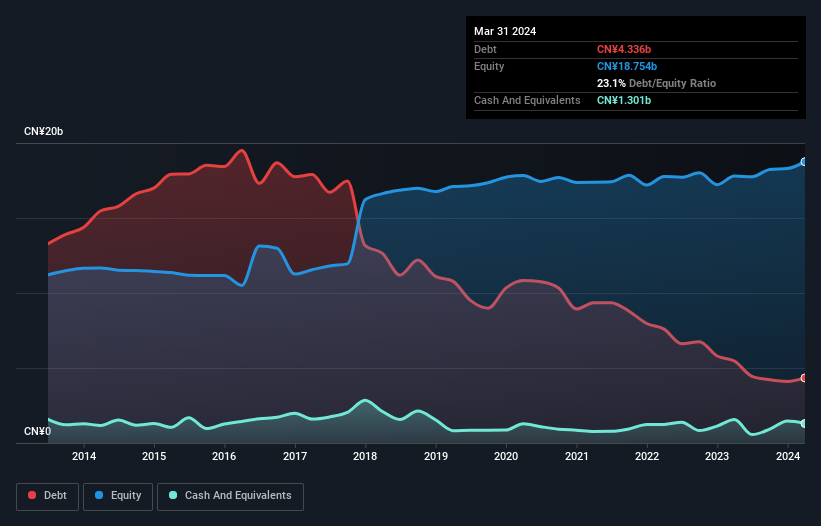- China
- /
- Metals and Mining
- /
- SHSE:600497
Is Yunnan Chihong Zinc & Germanium (SHSE:600497) Using Too Much Debt?

Warren Buffett famously said, 'Volatility is far from synonymous with risk.' So it might be obvious that you need to consider debt, when you think about how risky any given stock is, because too much debt can sink a company. We can see that Yunnan Chihong Zinc & Germanium Co., Ltd. (SHSE:600497) does use debt in its business. But should shareholders be worried about its use of debt?
When Is Debt A Problem?
Generally speaking, debt only becomes a real problem when a company can't easily pay it off, either by raising capital or with its own cash flow. Part and parcel of capitalism is the process of 'creative destruction' where failed businesses are mercilessly liquidated by their bankers. While that is not too common, we often do see indebted companies permanently diluting shareholders because lenders force them to raise capital at a distressed price. By replacing dilution, though, debt can be an extremely good tool for businesses that need capital to invest in growth at high rates of return. When we examine debt levels, we first consider both cash and debt levels, together.
Check out our latest analysis for Yunnan Chihong Zinc & Germanium
What Is Yunnan Chihong Zinc & Germanium's Net Debt?
The image below, which you can click on for greater detail, shows that Yunnan Chihong Zinc & Germanium had debt of CN¥4.34b at the end of March 2024, a reduction from CN¥5.46b over a year. However, it also had CN¥1.30b in cash, and so its net debt is CN¥3.03b.

A Look At Yunnan Chihong Zinc & Germanium's Liabilities
We can see from the most recent balance sheet that Yunnan Chihong Zinc & Germanium had liabilities of CN¥4.49b falling due within a year, and liabilities of CN¥4.01b due beyond that. Offsetting this, it had CN¥1.30b in cash and CN¥307.9m in receivables that were due within 12 months. So its liabilities total CN¥6.90b more than the combination of its cash and short-term receivables.
Yunnan Chihong Zinc & Germanium has a market capitalization of CN¥28.8b, so it could very likely raise cash to ameliorate its balance sheet, if the need arose. But we definitely want to keep our eyes open to indications that its debt is bringing too much risk.
We use two main ratios to inform us about debt levels relative to earnings. The first is net debt divided by earnings before interest, tax, depreciation, and amortization (EBITDA), while the second is how many times its earnings before interest and tax (EBIT) covers its interest expense (or its interest cover, for short). The advantage of this approach is that we take into account both the absolute quantum of debt (with net debt to EBITDA) and the actual interest expenses associated with that debt (with its interest cover ratio).
Yunnan Chihong Zinc & Germanium's net debt is only 0.99 times its EBITDA. And its EBIT easily covers its interest expense, being 22.1 times the size. So you could argue it is no more threatened by its debt than an elephant is by a mouse. But the bad news is that Yunnan Chihong Zinc & Germanium has seen its EBIT plunge 18% in the last twelve months. If that rate of decline in earnings continues, the company could find itself in a tight spot. The balance sheet is clearly the area to focus on when you are analysing debt. But it is future earnings, more than anything, that will determine Yunnan Chihong Zinc & Germanium's ability to maintain a healthy balance sheet going forward. So if you want to see what the professionals think, you might find this free report on analyst profit forecasts to be interesting.
Finally, while the tax-man may adore accounting profits, lenders only accept cold hard cash. So the logical step is to look at the proportion of that EBIT that is matched by actual free cash flow. Over the last three years, Yunnan Chihong Zinc & Germanium actually produced more free cash flow than EBIT. That sort of strong cash generation warms our hearts like a puppy in a bumblebee suit.
Our View
Yunnan Chihong Zinc & Germanium's interest cover was a real positive on this analysis, as was its conversion of EBIT to free cash flow. In contrast, our confidence was undermined by its apparent struggle to grow its EBIT. Considering this range of data points, we think Yunnan Chihong Zinc & Germanium is in a good position to manage its debt levels. But a word of caution: we think debt levels are high enough to justify ongoing monitoring. The balance sheet is clearly the area to focus on when you are analysing debt. However, not all investment risk resides within the balance sheet - far from it. We've identified 1 warning sign with Yunnan Chihong Zinc & Germanium , and understanding them should be part of your investment process.
When all is said and done, sometimes its easier to focus on companies that don't even need debt. Readers can access a list of growth stocks with zero net debt 100% free, right now.
New: Manage All Your Stock Portfolios in One Place
We've created the ultimate portfolio companion for stock investors, and it's free.
• Connect an unlimited number of Portfolios and see your total in one currency
• Be alerted to new Warning Signs or Risks via email or mobile
• Track the Fair Value of your stocks
Have feedback on this article? Concerned about the content? Get in touch with us directly. Alternatively, email editorial-team (at) simplywallst.com.
This article by Simply Wall St is general in nature. We provide commentary based on historical data and analyst forecasts only using an unbiased methodology and our articles are not intended to be financial advice. It does not constitute a recommendation to buy or sell any stock, and does not take account of your objectives, or your financial situation. We aim to bring you long-term focused analysis driven by fundamental data. Note that our analysis may not factor in the latest price-sensitive company announcements or qualitative material. Simply Wall St has no position in any stocks mentioned.
About SHSE:600497
Yunnan Chihong Zinc & Germanium
Yunnan Chihong Zinc & Germanium Co., Ltd.
Very undervalued with excellent balance sheet and pays a dividend.
Market Insights
Community Narratives



